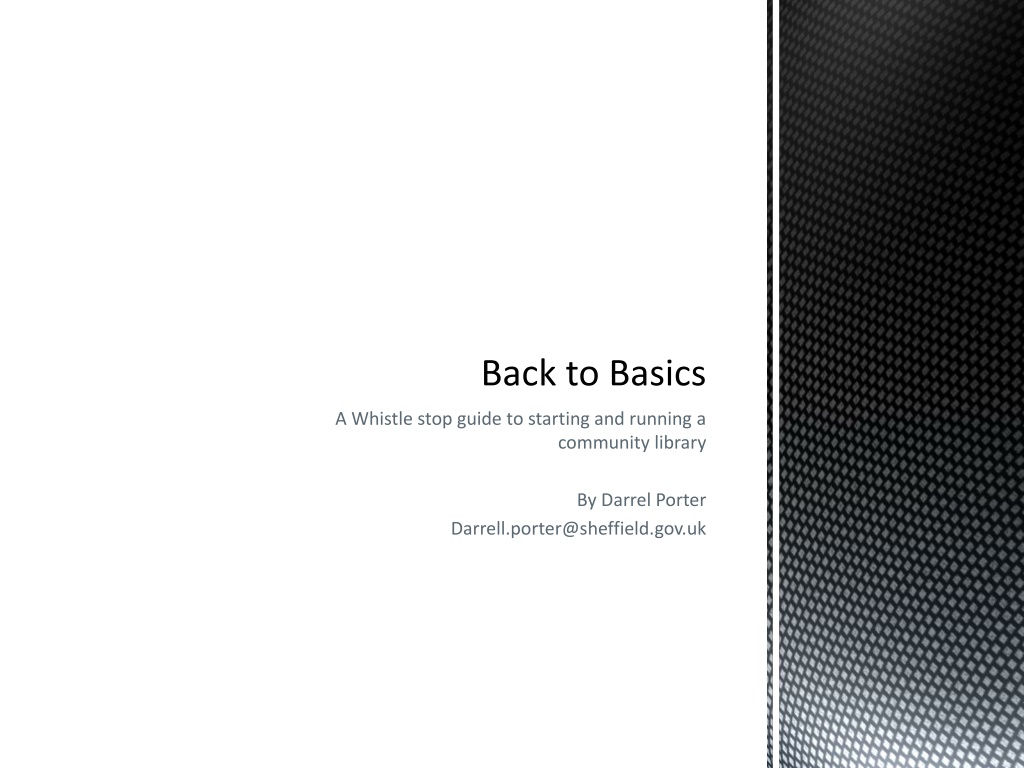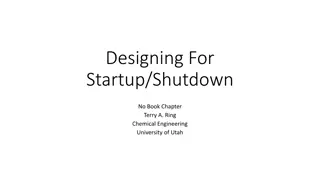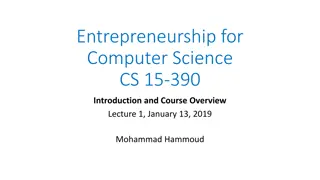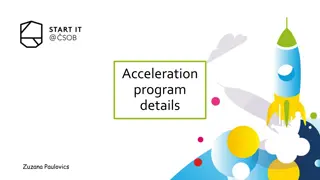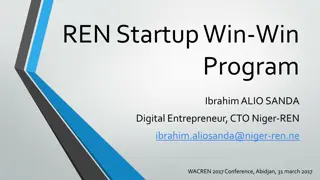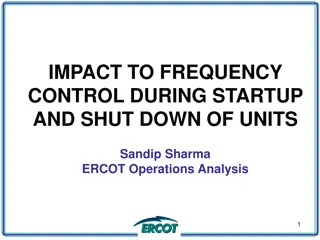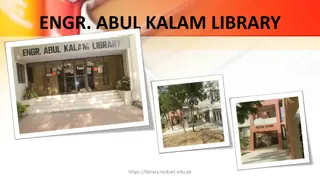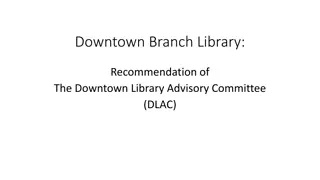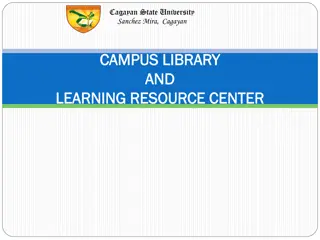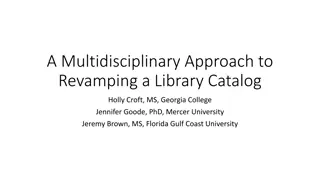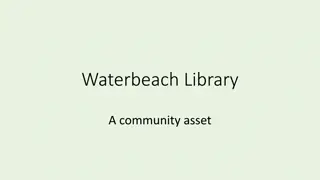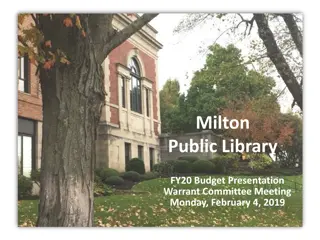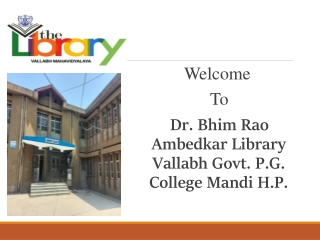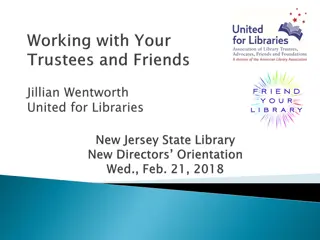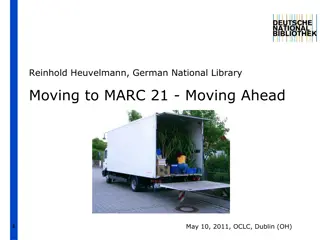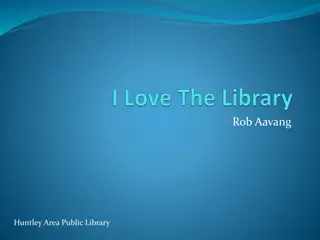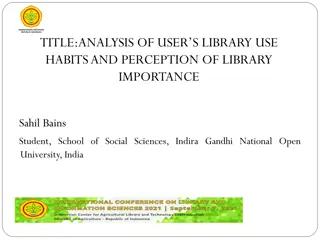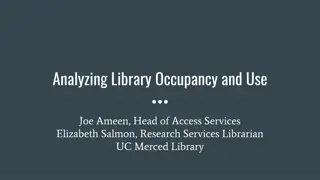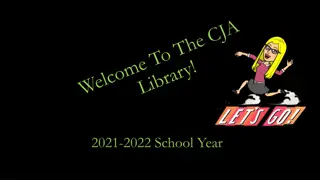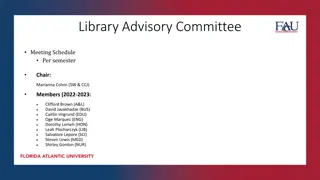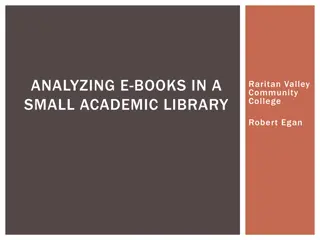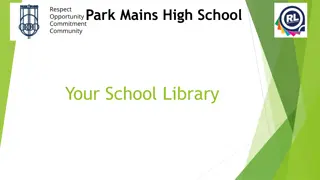Community Library Startup & Management Essentials
A comprehensive guide for starting and running a community library, covering various aspects such as working with the council, service models, establishing committees, volunteer management, funding, and more. This resource provides valuable insights and practical tips for those embarking on the journey of setting up a community library to serve their local area.
Download Presentation

Please find below an Image/Link to download the presentation.
The content on the website is provided AS IS for your information and personal use only. It may not be sold, licensed, or shared on other websites without obtaining consent from the author. Download presentation by click this link. If you encounter any issues during the download, it is possible that the publisher has removed the file from their server.
E N D
Presentation Transcript
Back to Basics A Whistle stop guide to starting and running a community library By Darrel Porter Darrell.porter@sheffield.gov.uk
This webinar aims to run through the basics of setting up and starting to run a community library. Running a community library is a complex and varied endeavour and a real challenge But it is worthwhile and can provide enormous benefit to the community as a whole. Intro
What are we covering? First steps Working with the council Service models Establishing your committee Becoming a charity? Asset Transfer Business plans Developing your volunteers Volunteer policy Recruitment & roles Training Succession Opening the library Day to day operation Sheffield case study LMS Stock management IT Buildings issues Developing your service Getting more books Universal Offers Funding/income Consult More than just books Links
First Steps Part 1
Working with the council Vital to establish a working dialogue with the local council. Local councillors can help if you are struggling to get through to anyone. Remember you want to keep the library open, this will look better for the local councillor than a closed library, but you may need a little help from the council. What council departments do you need to be talking with? Libraries Property Any others? Sometimes you will need to push for what you need. Do you need a grant Do you need a lease Do the furnishings, books and computers come with the library Will you be able to use the Library management system (LMS) Regular meetings Hold regular meetings with the council services you are working with to ensure that questions are being progressed, and to find out how you can help, remember you are not bound by the same restrictions as council officers. Work together This will be a recurring theme, if there are other local CMLs work with them. Many voices are stronger than one!
Service models What will your service model be? It may be that you can influence the shape of the service model, or it may have been pre-decided in a council cabinet decision. Either way it will have a huge influence on the way you operate. If you are able it will be beneficial if you can influence the shape of the service model. These are often set by cabinet decisions and usually operate on 3 year cycles. Take the time to understand the details of your service model and what options it leaves you with. For example does the model include funding from the council, or access to the LMS? For some examples of Service models see the community libraries network blog : https://communitylibrariesnetwork.wordpress.com/ Also see this research paper on the sustainability and effectiveness of community managed libraries https://www.gov.uk/government/publications/research-and-analysis-to- explore-the-service-effectiveness-and-sustainability-of-community-managed- libraries-in-england
Constituting your committee You need a committee to decide how your library will run and make strategic decisions. To set up a committee you will need a Chair, Treasurer and Secretary. It s important where possible to draw on people with a range of skills and knowledge, useful skills and experience include: Previous trustee experience Accounting/book keeping Buildings management Fund raising / bid writing Marketing Volunteer management Safeguarding When you come to formally constitute your committee this site has useful guides and templates https://www.gov.uk/topic/running-charity/setting-upOnce constituted you will likely want to consider whether or not to become a charity. Again the above site has useful guides, but also contact your local volunteer centre for advice. It is often the case that committees form naturally from friends of/protest groups, but you will sometimes need to recruit to specific roles. Your local volunteer action centre can often help with this. Visit https://www.navca.org.uk/members/members- directory for a useful directory.
Becoming a Charity Once you are constituted you may want to set up as a charity, the most common models seen in Community managed libraries are: Charitable Incorporated organisations Companies limited by guarantee Charitable trusts You will likely need to take advice on the best charity model for you and your local volunteer centre is well placed to provide this advice. Other organisations such as Locality can also provide support I this area http://locality.org.uk/ At this point you will need to consider your policy documents, to set up a charity you will need your charitable purposes and your governing document, but you will also need important policy documents such as: Safeguarding Data protection Codes of conduct Expenses policy Health and safety Equality and diversity Volunteer management
Asset transfer..? Do you want control of the building how much control/liability do you want over the building? Generally speaking the more control you have over the building the more liability you have. If you are planning on applying for large amounts of funding then the funding bodies will often expect you to have a 25 year lease. It is strongly advised that you get legal representation on any lease negotiations which can be lengthy and complex Organisations such as Locality can offer support and advice. It is generally beneficial to have a lease, but this will depend very much on your service model and the capacity of your organisation.
Business Plans It is vitally important that you develop a business plan, here s a brief guide and templates that are freely available online: https://knowhownonprofit.org/how-to/how-to-write-a-business-plan-for- your-charity Having a strong business plan in place will give you a strong document to guide your organisation so that you can remain focussed on delivering the best service you can. It is important to remember that this is a working document and can be updated and changed as needed rather than fixed in stone! Where possible plan accurately, but it becomes increasingly challenging to plan further into the future so business plans become more general the longer ahead they are looking.
Part 2 Developing Your Volunteers
It is vital that you develop a volunteer policy. This document will govern how you manage and interact with your volunteers. Visit this site for a good information on managing volunteers and creating volunteer policy: http://www.sheffieldvolunteercentre.org.uk/go od-practice-resources It is important to remember that volunteers are not employees, but must still be treated with dignity and respect, it is all too easy to over work and over rely upon keen volunteers, but this very quickly leads to burnout and volunteers leaving. Along with the volunteer policy it is a good time to create a volunteer handbook that can be given to each volunteer as a guide for them, so that they know what to expect and how to deal with any issues that may arise. Volunteer Policy
Recruitment & roles Define your roles. Shift leaders Shelving assistants Cleaners Gardeners Children s helpers Clear roles makes it easier to recruit and to keep boundaries in place. It is certainly important to have people around who can do everything, but volunteers able to commit enough time to develop all these skills will be few. Where possible recruit from your local community, but don t ignore people from outside your area, especially when they bring specialist skills. Recruitment needs to be continuous, you never know when you ll suddenly be short of volunteers. Sometimes you may need to build a waiting list as it can be detrimental to have too many volunteers. It can help if you have a dedicated team working on recruitment, this means it doesn t take over normal library work. Volunteer fairs can work, but the best recruitment comes from people who have visited the library and want to get involved!
Training Training is important, but can be time consuming and expensive. Where possible try and conduct training in house, it can be surprising what skills some people have to teach. Training opens up new opportunities for volunteers, it allows them to expand their scope, improves their employability if they re looking for work and keeps them active if they are not. Training generally improves volunteer morale as it shows them they are valued and allows them to feel well equipped. Where training could be expensive or specialist, contact your local volunteer centre, they can often source low cost or discounted training, and usually have good contacts. Consider contacting your local authority library service to see if you can join up with some of their training sessions. Remember that trustees will need training too, such as training in buildings compliance, fire safety, safeguarding or information security.
Succession Build in succession planning from the beginning. Your trustees will not and cannot be trustees forever, you will need people to replace them sooner than you think It is much harder to find new trustees when times are hard than when things are going well Take the approach that every volunteer is a potential trustee Anyone can be a trustee, foster an open approach that allows volunteers to see the trustees as one of them. Gently encourage volunteers to develop skills that will equip them to be trustees, give them responsibility where appropriate. Set up a management committee that bridges the gap between day to day volunteering and trusteeship. Management committees can be effective in dealing with operational tasks that can often consume all of a trustees time!
Opening the Library Part 3
Day to day operation Two days in a library are never the same! The best way to learn the day to day operation of your library is to learn from the staff who were previously operating the library. This is an option open to very few CMLs though. Encourage your local authority Library service to show you the operations of the library, this is especially important if they are leaving their equipment and LMS in the library. Always ensure you have enough volunteers to safely open the building, if not don t feel under pressure to open. Ensure that at least one volunteer in each shift is experienced and knows where to access the contact details of trustees. Time tabling is very important and can be especially challenging during holiday periods. Some libraries successfully use software solutions to solve this problem such as Three Rings https://www.threerings.org.uk/ or basecamp https://basecamp.com/ though there is a cost associated with these programs.
Day to day solutions A Sheffield Case study Sheffield has a diverse field of 16 CMLs Sheffield Library Service works closely with the CMLs giving them full access to the LMS. All the Sheffield CMLs have contact details of council officers who can assist with any problems associated with opening the library. There is a dedicated Volunteer Coordinator who is experienced in all aspects of running libraries who is first point of contact, from there issues can be passed onto IT support or facilities management. The Volunteer coordinator can deal with most issues directly. All CMLs were shown the running of the library whilst they were staffed by the council, thus allowing a continuity of service. All volunteers are given the same level of LMS training as Council library Assistants Members from the CMLs are encouraged to meet on a regular basis and have an open and constructive forum to raise and discuss any issues or good practice. This is supported and attended by the local authority library service.
A word on LMS Library management systems or LMS are very complex. Ideally your local authority will give you access to the LMS. At times this may not be possible due to cost or service models. If you have no access to the LMS then you will need to explore options around acquiring your own. Remember to consider: Set up cost Ongoing license cost Web server cost Training costs Updating/ maintenance cost Also Complexity, are your volunteers going to be able to use it? Is it just for you or will it link up several libraries? How will you add all your existing stock to it? You want to avoid being an isolated library, really it is best to share a system with other libraries so that you can order and transfer books. Finally, if you have your own system this will have implications for data protection, so this must be considered.
Stock management A major part of library work but easily over looked in a new volunteer library. Ensure that all volunteers that work with the books in the library understand the importance of keeping the books (and other materials) in good order and good condition. Approach local authority library service for guidance, especially if you are using their LMS and stock. What level of access to you have to the LMS? You may need to discard stock from the catalogue. Disposal of old stock, don t be afraid to get rid of it Sell Recycle Throw away Use a book disposal company such as Revival Books http://www.revivalbooks.co.uk/ Make use of the data available through your LMS. What categories issue, what doesn t?
IT You will need computers to effectively deliver a library service, and you will need volunteers comfortable and happy using computers. Does your library come with computers? Who manages the IT maintenance contract Do you have any flexibility to upgrade or add software Do you have to pay for them Does your library have public access computers? As above who manages the contract for these Do you have acceptable use policies in place Are they filtered Do you charge for use Do you have WiFi? Ask the same questions as above and also how do you give people access? Is it password locked? See Sheffield case study
Buildings Issues Who manages repairs and maintenance of your building? This will very much depend on your service model and lease agreement. Ensure that you have clear lines of communication in case of any problems, consider what you would do if the library shutters won t open (or close). Or if you have a bad leak. Check the details of the security alarm, do you know who to contact in case of faults, what happens if the alarm is triggered at night? It is very important that you have your building compliance checked, that means, fire safety, water (specifically testing for Legionella) and asbestos checks as well as PAT testing of electrical equipment. Other important considerations are refuse collection and hygienic waste collection services. It may be that all these services are provided by the local authority, but it is key to have overview of these yourselves.
Developing your service Part 4
Getting More books Libraries are all about books, they are our key service. Are new books part of your service model? Are you able to add books to the LMS? You will get books donated, you will want to sell some of them, but some you may want to add to stock, but donated books are not enough. It is vital that you have a steady supply of new books on the shelves in your library. You do not need a lot of new books. Using income from donated book sales is an excellent way to secure funds to buy new books. You need a range of new books, fiction, non-fiction, children s fiction/non- fiction
The Universal Offers The Society of Chief Librarians suggests six Universal Offers that all public libraries should strive to offer: http://goscl.com/universal-offers/ The Reading offer: to advocate for reading and promote it as a journey from birth throughout life. To offer reading materials in a full range of formats accessible to all. The Health Offer: to promote the health and wellbeing benefits of reading and to engage with health providers to contribute to the health and wellbeing of the community. The Digital Offer: to fully utilise available digital services, to offer access and support to library users. The Culture Offer: To be a centre of vibrant cultural activities and experiences reaching people who can be difficult to engage. The Information Offer: To support access to vital information, such as government and health sites. The Learning Offer: To act as a hub of learning for all the community through activities, access to books and information and by providing a space where people of different ages and backgrounds can come and learn together.
Funding/income Libraries need money to operate. The main challenge is in securing funding to cover ongoing costs: Utility bills Business rates Maintenance/ compliance checking contracts It can often be easier to secure funding for one off events or projects. Spend time developing a number of potential projects as funding opportunities may often appear at very short notice. Any income you generate you can usually spend how you want, so it is beneficial to maximise income where possible. Community fairs Community markets Subscriptions Film clubs Talks/quizzes
Consult More often than not, if you are running a CML then you are part of the community. But you are not all of the community you need to consult! Give your community a voice Ensure feedback is easily given and well received Survey your community Community fairs/markets Delivering surveys by hand Posting and emails where you have the details and permission Listen and act, there is no point surveying if you are going to do nothing. Publish details of what you are doing, newsletters can be good for this as well as the local press.
More than just books Funding bodies are reluctant to give money to CMLs that are just doing the regular Consider diversifying your offer, what can you provide, see the Libraries taskforce blog for some examples of good practice https://librariestaskforce.blog.gov.uk/ Remember the Universal offers and link in with these where possible. Some examples: Health and nature walks Dementia cafes Music groups Film clubs Coding clubs Maker spaces
Get connected Link up with other CMLs, if there are more in your area then form a group with them, and meet regularly. In Sheffield we have the VLiS (Voluntary Libraries in Sheffield) group that meets monthly. Share good practice Acts as an advocating voice Works together for funding Able to act as a strong single voice to the council Sourcing training Sharing skills In Sheffield the meeting were initially facilitated by the Sheffield Library Service, but the volunteers soon took over and now lead the meetings themselves. The benefits of meeting with and working closely with other CMLs cannot be overstated! Join the Community Libraries Network to get news and updates from other CMLs
Links https://www.gov.uk/government/collections/libraries-shaping-the-future-report- and-case-studies Libraries taskforce toolkit showing good practice from across the country. https://librariestaskforce.blog.gov.uk/ Libraries taskforce blog showing case studies, good practice and a host of news and useful info. https://communitylibrariesnetwork.wordpress.com/ Blog page for the communities libraries network. http://goscl.com/wp-content/uploads/SCL-Universal-Offers-Calendar-2018.pdf A really helpful visual representation of the universal offers https://www.navca.org.uk/ membership of local voluntary actions groups, these are a vital source of information and support http://locality.org.uk/ A network of community led organizations that can provide great support.
